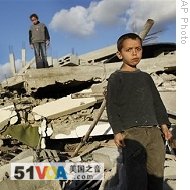Geneva
18 January 2009
The U.N. World Food Program says it is launching an operation to increase the distribution of food to people caught in the conflict in the Gaza Strip. The World Food Program says the number of Palestinians needing food aid has escalated substantially since Israel began its military incursion into Gaza at the end of last year.
In more or less normal times, the World Food Program assists 265,000 non-refugee Palestinians in the Gaza Strip. But, these are not normal times and the U.N. food agency says it has had great difficulty providing aid to its beneficiaries.
 |
| Palestinian children looking for belongings stand on the remains of their destroyed house in the heavily hit eastern area of Jebaliya, in the northern Gaza strip, 18 Jan 2009 |
She says the World Food Program will have to provide food aid to a further 100,000 people, raising the caseload to 365,000.
"We are also launching an Operation Lifeline Gaza aimed to raise funds and obtain and bring in more ready to eat style foods. And, we are hoping in the coming days to be able to distribute 23,000 MRE's or Meals-Ready-To-Eat. There would be 16,000 of them for people in UNRWA [UN Relief and Works Agency] shelters and 7,000 people in hospitals for up to 12 days."
Gaza has a population of 1.5 million people. The U.N. Relief and Works Agency takes care of the refugee population and is feeding more than one-million Palestinian refugees in Gaza. The World Food Program is helping 80 percent of the resident non-refugee population.
Aid agencies have had great difficulty providing food and non-food assistance to the inhabitants of Gaza during the fighting during the past three weeks. While they welcome Israel's unilateral ceasefire, they say they expect delivery problems to persist.
WFP spokeswoman Casella says shipments of goods between Israel and Gaza are erratic because of the frequent closure of crossing points along the border. So, she says, the World Food Program is planning ahead.
"We will be providing a higher ration. We are increasing our ration to 2,100 kilocalories per person, per day," she added.It was 1,400 kilocalories per person, per day. And, we are going to be doing that for the next two to three months to make up for the fact that basically many of the people who would have been receiving food have not been receiving it. If they are able to get it, we also want to make sure that we give them as much as we can at this time because we are not sure when and if they will be able to come back to get replenishments."
The U.N. Children's Fund says it believes the incidence of severe malnutrition among children has probably increased because of the current violence in Gaza. It says it anticipates an increased caseload in the coming weeks due to deteriorating conditions.
UNICEF says it will be working with the World Food Program and other partners to monitor the situation to get early and effective treatment to children suffering from acute malnutrition.